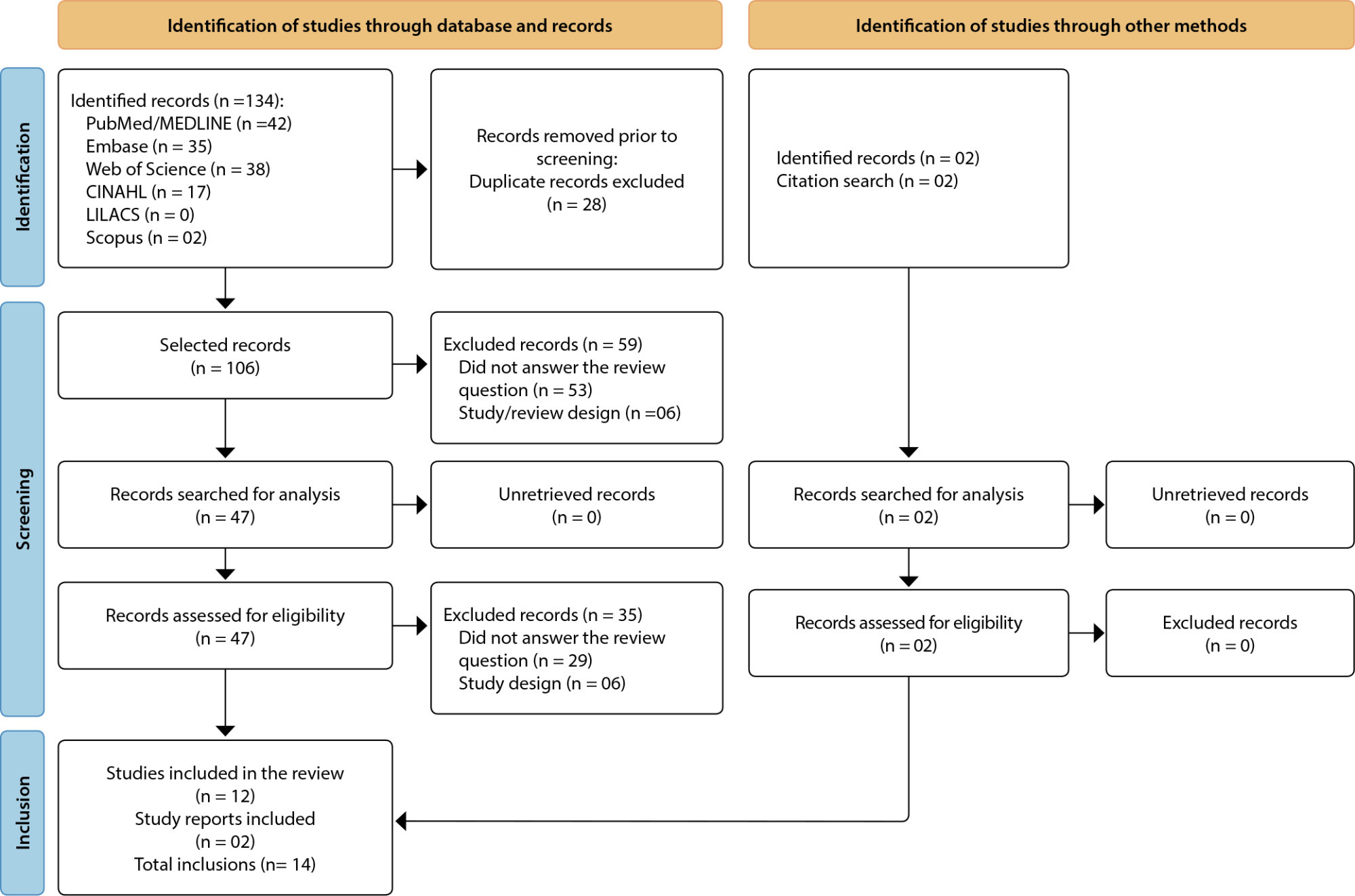-
Maternal Concerns in Home Care for the Premature Newborn: An Integrative Review
Revista Brasileira de Enfermagem. 2023;76(6):e20220769
12-04-2023
Abstract
Maternal Concerns in Home Care for the Premature Newborn: An Integrative Review
Revista Brasileira de Enfermagem. 2023;76(6):e20220769
12-04-2023DOI 10.1590/0034-7167-2022-0769
Views0See moreABSTRACT
Objective:
To identify and analyze the scientific literature, both national and international, concerning the primary maternal concerns about caring for premature newborns at home.
Methods:
This integrative review is based on the guiding question: “What scientific publications from 2012 to 2021 address maternal concerns about the care of premature newborns at home?”. Searches were conducted in the electronic databases: Embase, Medline, Web of Science, Lilacs, Scielo, and Cochrane Library.
Results:
A total of 21 articles were identified. The qualitative analysis showed that maternal concerns pertained to breastfeeding, hygiene, sunbathing practices, managing infant colic, identifying signs, symptoms, and clinical changes, temperature control, and the third phase of the kangaroo method.
Conclusions:
Maternal uncertainties underscore the importance of enhancing strategies focused on supporting families and ensuring continued care for neonates at home.

-
ORIGINAL ARTICLE
Psychometric Properties of an Instrument for Assessing University Administrators’ Knowledge on Gender-Based Violence
Revista Brasileira de Enfermagem. 2023;76(6):e20220770
12-04-2023
Abstract
ORIGINAL ARTICLEPsychometric Properties of an Instrument for Assessing University Administrators’ Knowledge on Gender-Based Violence
Revista Brasileira de Enfermagem. 2023;76(6):e20220770
12-04-2023DOI 10.1590/0034-7167-2022-0770
Views0ABSTRACT
Objective:
To evaluate the factorial structure of the instrument measuring university administrators’ knowledge of gender-based violence.
Methods:
This cross-sectional methodological study was conducted from August to November 2020 with 101 university administrators. Data on demographic and functional characteristics were collected, and the “QUEST VBG UNIV” instrument was applied. Descriptive analysis was performed, the structure of the questionnaire was assessed using exploratory factor analysis (EFA), and the stability of the factors was verified through ORION and FDI tests.
Results:
Of the original 38 items across the 4 sections of the questionnaire, 19 were retained within 2 factors, with appropriate factor loadings. Factor 1 had an explained variance of 15.69%, and Factor 2 had an explained variance of 9.10%. The reliability was deemed satisfactory (ORION > 0.900, FDI > 0.900).
Conclusions:
The questionnaire presented a valid and reliable factorial structure for measuring knowledge about gender-based violence, thereby representing a suitable option for situational assessments in universities.
Keywords:Factor AnalysisGender-Based ViolencePsychometricsStatisticalValidation StudyWorkplace violenceSee more
-
ORIGINAL ARTICLE
Hospital discharge planning in care transition of patients with chronic noncommunicable diseases
Revista Brasileira de Enfermagem. 2023;76(6):e20220772
12-04-2023
Abstract
ORIGINAL ARTICLEHospital discharge planning in care transition of patients with chronic noncommunicable diseases
Revista Brasileira de Enfermagem. 2023;76(6):e20220772
12-04-2023DOI 10.1590/0034-7167-2022-0772
Views0ABSTRACT
Objective:
to analyze care transition in hospital discharge planning for patients with chronic noncommunicable diseases.
Method:
a qualitative study, based on the Care Transitions Intervention theoretical model, with four pillars of intervention, to ensure a safe transition. Twelve professionals participated in a public hospital in the countryside of São Paulo. Data were collected through observation, document analysis and semi-structured interviews.
Results:
there was a commitment of a multidisciplinary team to comprehensive care and involvement of family members in patient care. The documents facilitated communication between professionals and/or levels of care. However, the lack of time to prepare for discharge can lead to fragmented care, impairing communication and jeopardizing a safe transition.
Final considerations:
they were shown to be important elements in discharge planning composition, aiming to ensure a safe care transition, team participation with nurses as main actors, early discharge planning and family involvement.
Keywords:Continuity of Patient CareNurse's RolePatient DischargePatient-Centered CareProcess AssessmentTransitional CareSee more -
ORIGINAL ARTICLE
Meanings of nurses’ role in Child and Adolescent Psychosocial Care Centers
Revista Brasileira de Enfermagem. 2023;76(6):e20230124
12-04-2023
Abstract
ORIGINAL ARTICLEMeanings of nurses’ role in Child and Adolescent Psychosocial Care Centers
Revista Brasileira de Enfermagem. 2023;76(6):e20230124
12-04-2023DOI 10.1590/0034-7167-2023-0124
Views0See moreABSTRACT
Objective:
to analyze the meaning attributed to nurses’ role in mental health care in Child and Adolescent Psychosocial Care Centers.
Methods:
qualitative research, anchored in the paradigm of complexity. Data collection was carried out through online semi-structured interviews with ten nurses from São Paulo, between March and September 2022, being analyzed thematically.
Results:
the diversity and specificity of a child and adolescent mental health clinic, with the need for expanded, territorial and intersectoral care, were unveiled in addition to a fragmented training in the area. There was a need for a deconstruction of being a nurse to make it possible to produce more inclusive and salutogenic practices.
Final considerations:
the need for training nurses with adequate knowledge and skills to care for the mental health of children, adolescents and their families is reinforced as well as permanent education of working teams.
-
Transition of Care for Individuals with Mental Disorders in Brazil: A Contextual Analysis
Revista Brasileira de Enfermagem. 2023;76(6):e20230063
12-04-2023
Abstract
Transition of Care for Individuals with Mental Disorders in Brazil: A Contextual Analysis
Revista Brasileira de Enfermagem. 2023;76(6):e20230063
12-04-2023DOI 10.1590/0034-7167-2023-0063
Views0See moreABSTRACT
Objective:
To describe the contexts of care transition for individuals with mental disorders in the Brazilian setting.
Methods:
A contextual analysis was conducted through a scoping review. The search for studies was conducted in databases and thesis and dissertation portals, and the analysis was based on immediate, specific, general, and meta-contexts.
Results:
The sample, consisting of eight studies, indicated that the following factors are present in the contexts where care transition occurs: Peculiarities of care transition for individuals with mental disorders; Perspectives that can strengthen or weaken this transition; Approaches proposed in the past for the development of care transition; and Elements related to Brazilian legislation.
Final Considerations:
It is observed that the transition of care for individuals with mental disorders in Brazil takes place in various contexts of care levels. These variations present significant potentials and barriers in the care scenarios.
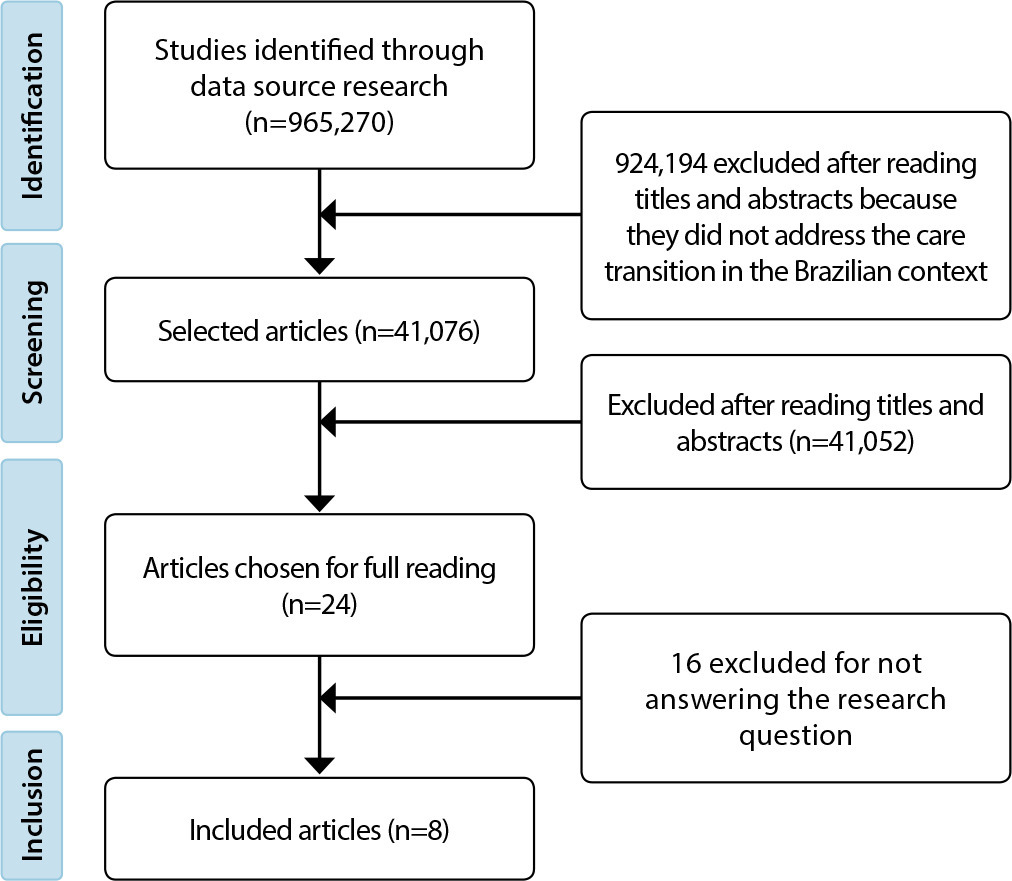
-
ORIGINAL ARTICLE
Effect of cardiovascular biofeedback on nursing staff stress: a randomized controlled clinical trial
Revista Brasileira de Enfermagem. 2023;76(6):e20230069
12-04-2023
Abstract
ORIGINAL ARTICLEEffect of cardiovascular biofeedback on nursing staff stress: a randomized controlled clinical trial
Revista Brasileira de Enfermagem. 2023;76(6):e20230069
12-04-2023DOI 10.1590/0034-7167-2023-0069
Views0See moreABSTRACT
Objective:
to assess the effect of cardiovascular biofeedback on nursing staff stress when compared to an activity without self-monitoring.
Method:
a randomized controlled clinical trial, carried out with nursing professionals from a university hospital. The intervention group (n=58) performed cardiovascular biofeedback, and the control (n=57) performed an online puzzle without self-monitoring, totaling nine meetings over three weeks. The outcome was assessed using the Stress Symptoms and Work-Related Stress scales, and the biological marker heart rate variability. The generalized estimating equations method was used.
Results:
the intervention had no effect on self-reported instruments (p>0.050). However, there was an effect of time (p<0.050) on all heart rate variability indicators, demonstrating changes over the sessions.
Conclusion:
cardiovascular biofeedback showed promising results in the biological marker, suggesting that it can be used in nursing staff as a complementary therapy by promoting better autonomic nervous system regulation.

-
ERRATUM
ERRATUM
Revista Brasileira de Enfermagem. 2023;76(6):e2023n6e06
12-04-2023
Abstract
ERRATUMERRATUM
Revista Brasileira de Enfermagem. 2023;76(6):e2023n6e06
12-04-2023DOI 10.1590/0034-7167.20237606e06
Views0In the article “Undergraduate nursing students’ knowledge and experience in infusion therapy and peripheral vascular acces”, with DOI number: , published in Revista Brasileira de Enfermagem, 2023;76(3): e20220219, authored:Where it read:[…]See more
-
Hospital care and urinary incontinence in the elderly
Revista Brasileira de Enfermagem. 2019;72:284-293
12-05-2019
Abstract
Hospital care and urinary incontinence in the elderly
Revista Brasileira de Enfermagem. 2019;72:284-293
12-05-2019DOI 10.1590/0034-7167-2018-0273
Views0See moreABSTRACT
Objective:
to identify factors inherent in hospital care that favor urinary incontinence in the elderly.
Method:
an integrative review with Scopus, CINAHL and Pubmed searches. Includes original articles, no language restriction, published between 2008 and 2018. Rated level of recommendation and level of evidence were assessed using the Oxford Center for Evidence-Based Medicine classification. Exploited content through thematic analysis in light of the Donabedian model.
Results:
13 articles constituted the sample. There were factors such as the unjustified and indiscriminate use of devices such as the geriatric diaper; hospital structure adversely affecting the needs of the elderly; and deficit in screening, risk identification and underreporting of the problem favor urinary incontinence in the hospitalized elderly.
Conclusion:
modifiable factors related to hospital structures and care processes favor both the onset and worsening of urinary incontinence in the elderly.
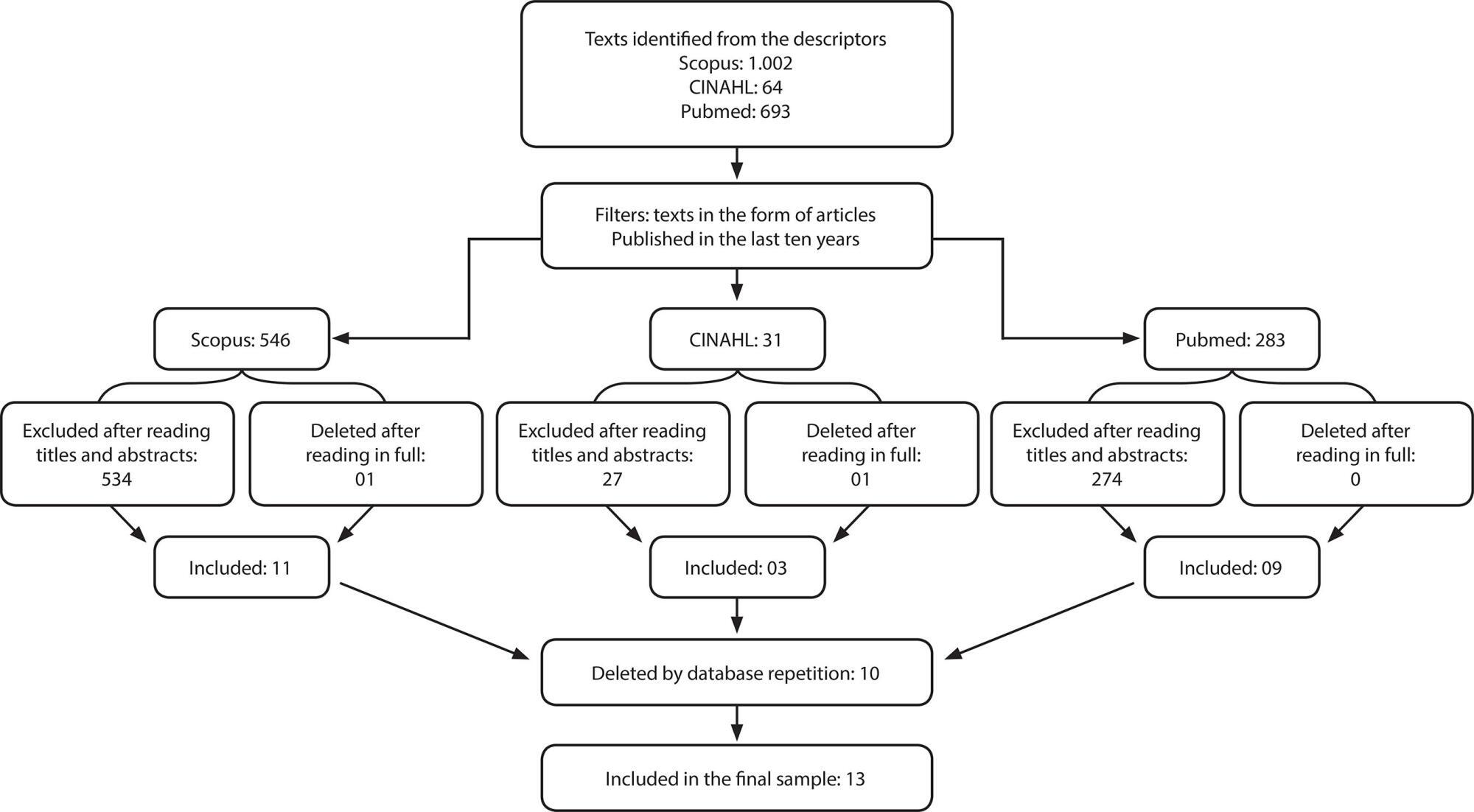
-
ORIGINAL ARTICLE
Nurse safety culture in the services of a university hospital
Revista Brasileira de Enfermagem. 2019;72(3):767-773
06-27-2019
Abstract
ORIGINAL ARTICLENurse safety culture in the services of a university hospital
Revista Brasileira de Enfermagem. 2019;72(3):767-773
06-27-2019DOI 10.1590/0034-7167-2018-0376
Views0See moreABSTRACT
Objective:
To evaluate nurse safety culture in a teaching hospital, as well as to verify differences in the safety culture dimensions between services.
Method:
cross-sectional, quantitative study, conducted from October to December 2015, in a university hospital. The instrument Hospital Survey on Patient Safety Culture was applied.
Results:
A total of 195 nurses from four different services participated in the study. Significant difference between services were identified for five dimensions of safety culture: organizational learning (P=0.012); return of information and communication about error (P=0.014); management support for patient safety (P=0.001); general perceptions about patient safety (P=0.005); and frequency of event notification (P=0.003).
Conclusion:
The medical clinic service had the highest statistical difference between the dimensions. These evaluations allow managers to identify the differences between the same hospital’s services, serving as a warning and assisting in the services’ improvement.
-
REVIEW
Effects of acupuncture in patients with chronic kidney disease: a systematic review
Revista Brasileira de Enfermagem. 2020;73(4):e20180784
05-18-2020
Abstract
REVIEWEffects of acupuncture in patients with chronic kidney disease: a systematic review
Revista Brasileira de Enfermagem. 2020;73(4):e20180784
05-18-2020DOI 10.1590/0034-7167-2018-0784
Views0See moreABSTRACT
Objectives:
to analyze the effects of acupuncture techniques in patients with chronic kidney disease.
Methods:
a systematic review conducted in six databases, from September to December 2017, following the Preferred Reporting Items for Systematic Reviews and Meta-Analyses’ criteria. The following descriptors were used: Acupuncture AND Chronic Renal Insufficiency AND Clinical Trial.
Results:
nine studies were selected; the acupuncture techniques used were auriculotherapy, electroacupuncture and acupressure aimed at improving quality of life, fatigue, sleep and clinical variables of the disease. The studies that assessed quality of life, sleep and fatigue presented significant benefits. Studies that assessed quality of life, sleep and fatigue presented significant benefits. There was no statistical significance in the improvement of serum creatinine levels and glomerular filtration rate. Methodological and assessment tools’ divergence made impossible meta-analysis
Conclusions:
studies reinforce the positive effect of acupuncture in improving quality of life, fatigue and sleep in patients.
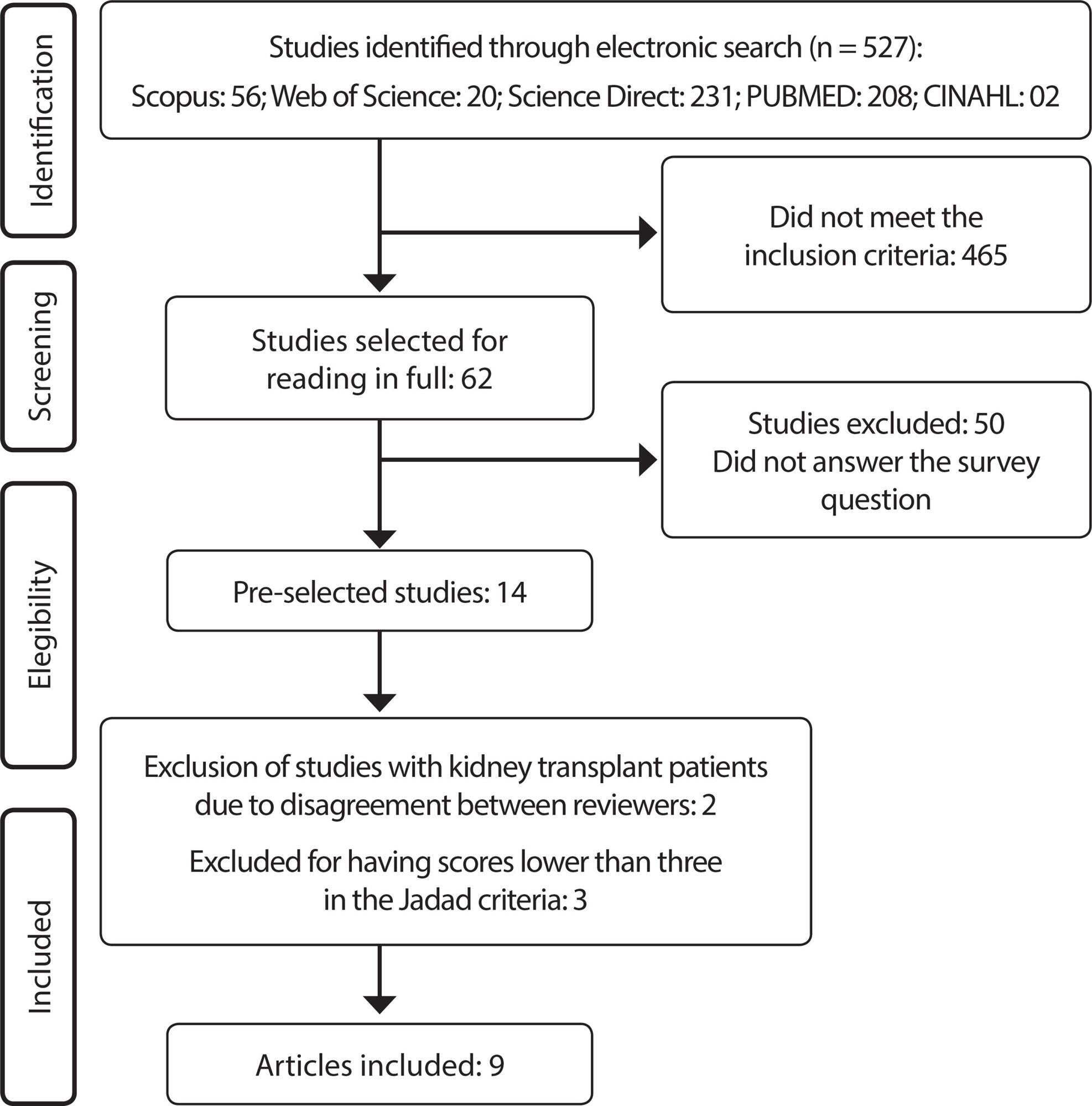
-
ORIGINAL ARTICLE
Configuration of power relations in physicians and nurses’ professional practices
Revista Brasileira de Enfermagem. 2020;73:e20180629
05-15-2020
Abstract
ORIGINAL ARTICLEConfiguration of power relations in physicians and nurses’ professional practices
Revista Brasileira de Enfermagem. 2020;73:e20180629
05-15-2020DOI 10.1590/0034-7167-2018-0629
Views0ABSTRACT
Objective:
to analyze the configuration of power relations constituted in and by the knowledge and daily practices of physicians and nurses in an Intensive Care Unit (ICU).
Method:
qualitative study in which data were collected through interviews with physicians and nurses from an ICU of a hospital in Belo Horizonte, Minas Gerais. A semi-structured script was used. Data were analyzed through discourse analysis in a Foucaultian perspective.
Results:
three categories were developed – Professional Identity: self-recognition in the profession; Discipline: individualizing attitudes or collective need?; and Circularity of knowledge and power in the constitution of daily practices.
Final considerations:
the identity, discipline and circulation of power are connected in a continuous movement of subjectivation of the subject, which, in turn, uses discourse as a persuasion strategy to modify the position taken over in different situations thereby causing the circulation of power.
Keywords:Health Knowledge, Attitudes, PracticeHospitalsPhysician-Nurse RelationsPower (Psychology)Professional PracticeSee more -
ORIGINAL ARTICLE
Perception of body image and nutritional status in adolescents of public schools
Revista Brasileira de Enfermagem. 2019;72:229-235
12-05-2019
Abstract
ORIGINAL ARTICLEPerception of body image and nutritional status in adolescents of public schools
Revista Brasileira de Enfermagem. 2019;72:229-235
12-05-2019DOI 10.1590/0034-7167-2018-0644
Views0See moreABSTRACT
Objective:
To assess body image dissatisfaction among adolescents from Northern Minas Gerais.
Method:
This is a cross-sectional study with adolescents of both sexes, enrolled in the sixth to ninth year in the municipal public education network. A questionnaire was used, composed of sociodemographic and body image variables, which was obtained through a scale of silhouette figures. The anthropometric measurements of weight and height were performed to estimate body mass index. The correlation between the classification of the body mass index and the body image of adolescents was estimated through weighted Kappa.
Results:
A total of 535 adolescents participated, and 24.5% had different classifications between the real and ideal body image. The Kappa index for the classification of body image was 0.51, 0.58 and 0.32 for the total of adolescents, girls and boys, respectively.
Conclusion:
Public school adolescents are dissatisfied with their self-body image.
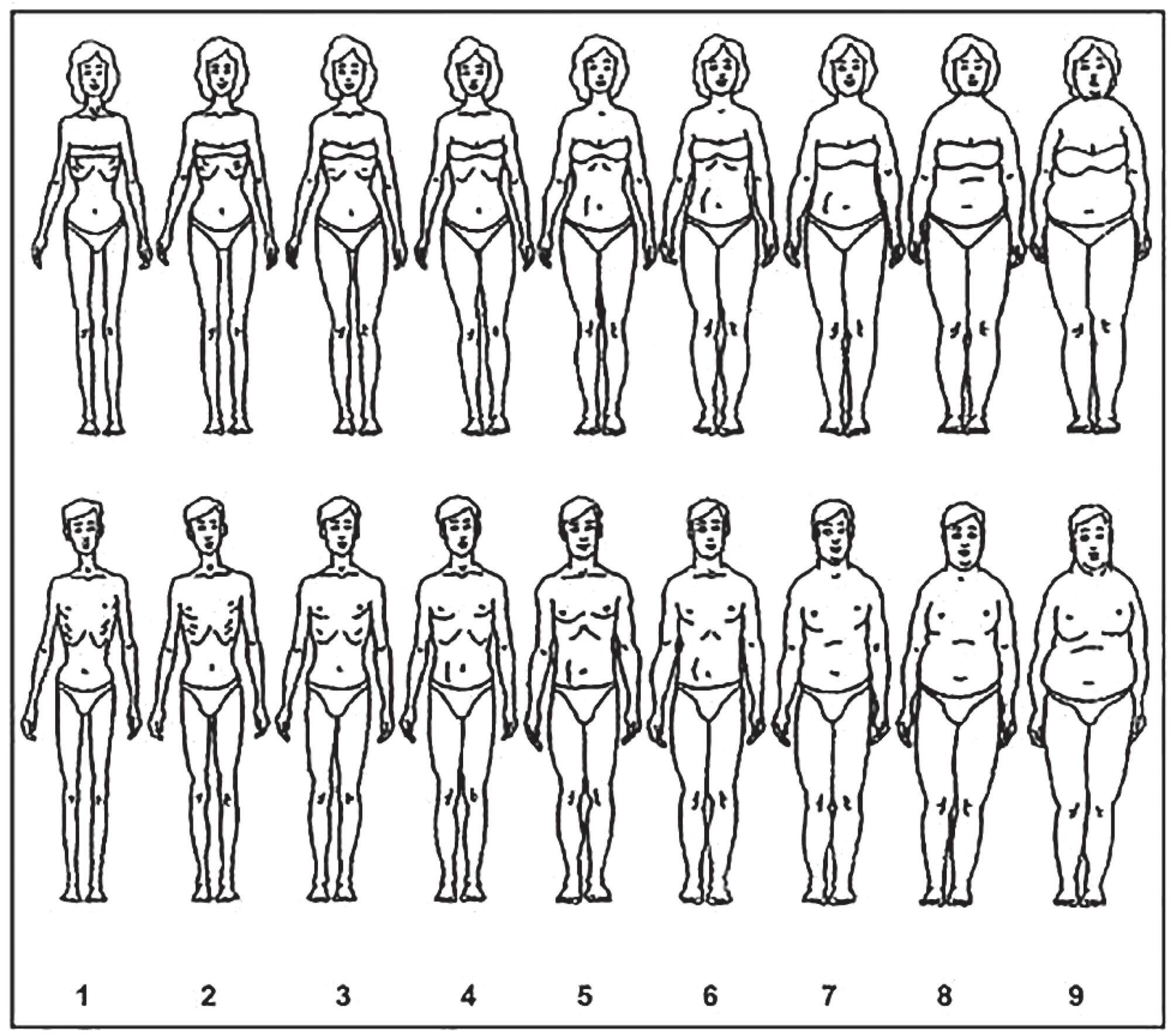
-
Selenium concentrations in elderly people with Alzheimer’s disease: a cross-sectional study with control group
Revista Brasileira de Enfermagem. 2021;74:e20200984
07-05-2021
Abstract
Selenium concentrations in elderly people with Alzheimer’s disease: a cross-sectional study with control group
Revista Brasileira de Enfermagem. 2021;74:e20200984
07-05-2021DOI 10.1590/0034-7167-2020-0984
Views0See moreABSTRACT
Objective:
To investigate possible differences in plasma and erythrocyte concentrations of selenium among elderly with and without a diagnosis of Alzheimer’s disease (AD).
Methods:
Cross-sectional study, performed with an elderly group with Alzheimer’s disease, diagnosed by a geriatric doctor, and compared to an elderly group without the disease, equaling gender, education, and age. Atomic absorption spectrophotometry determined plasma and erythrocyte concentrations of total selenium (Set).
Results:
The mean age was 74.41±7.1 years in the Alzheimer’s disease group and 71.46±5.1 years among the control group. The Alzheimer’s disease group presented lower plasma concentrations (mean of 45.29±14.51 µg/dL vs. 55.14±14.01 µg/dL; p=0.004), and erythrocyte Set (median of 56.36 µg/L vs. 76.96 µg/L; p<0.001). The logistic regression model indicated an association between erythrocyte Set concentrations and diagnosis of Alzheimer’s disease (p=0.028).
Conclusion:
Elderly with Alzheimer’s disease present lower selenium concentrations in the evaluated organic compartments.
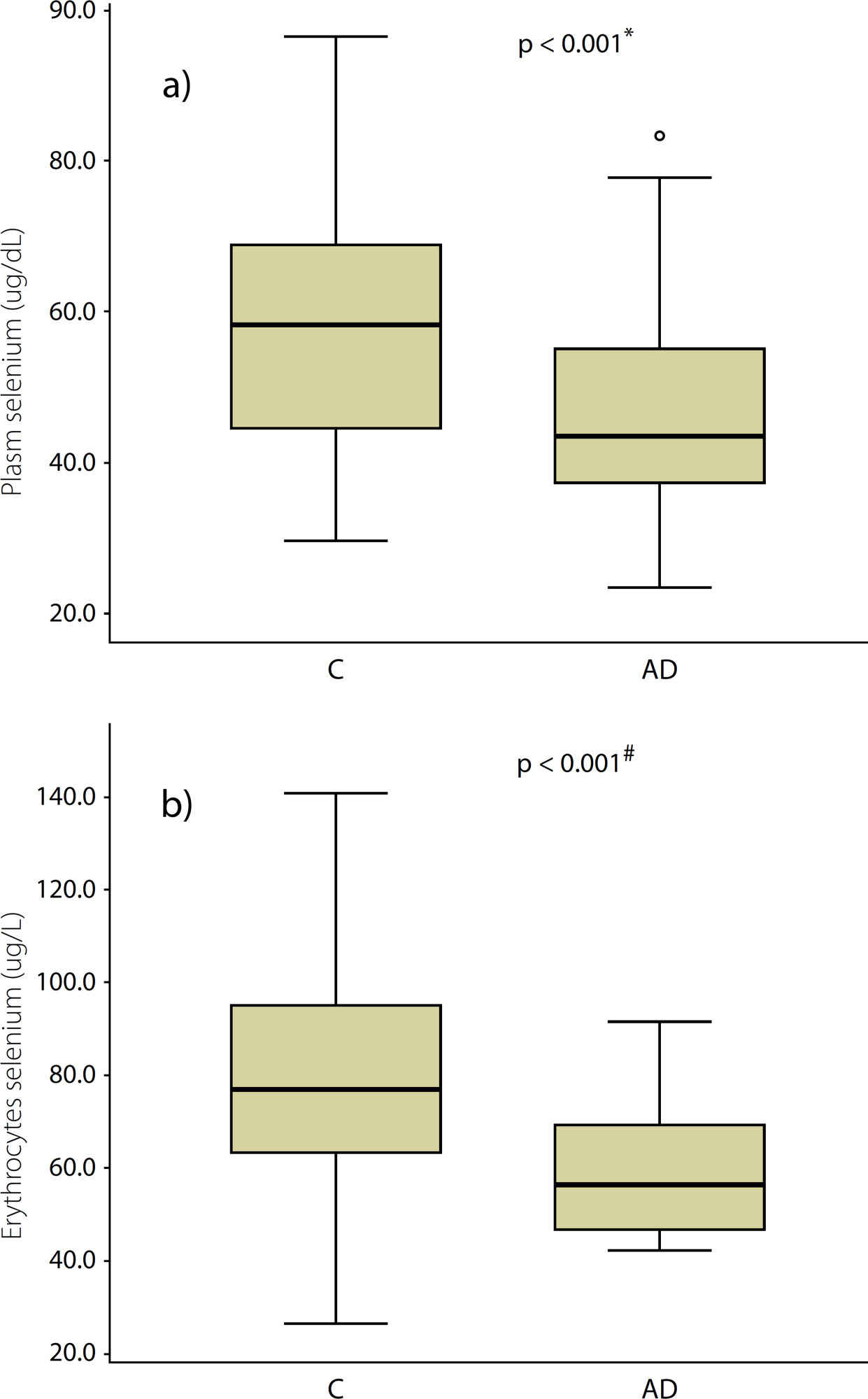
-
ORIGINAL ARTICLE
Mental health in primary health care: health-disease according to health professionals
Revista Brasileira de Enfermagem. 2019;72(6):1609-1617
10-21-2019
Abstract
ORIGINAL ARTICLEMental health in primary health care: health-disease according to health professionals
Revista Brasileira de Enfermagem. 2019;72(6):1609-1617
10-21-2019DOI 10.1590/0034-7167-2018-0743
Views0See moreABSTRACT
Objective:
to analyze perceptions of the Family Health Strategy (FHS) professional team about mental health-disorder and to identify health actions developed by the team for people with mental disorders.
Method:
a qualitative study of a Marxist theoretical framework and a dialectical method. 99 FHS middle and higher level professionals from São Paulo participated. Semi-structured interviews were conducted. Data were submitted to ALCESTE software and Thematic Content Analysis.
Results:
there were three empirical categories: Training in Mental Health; Perception of the FHS professional about mental health-disorder; and Health actions developed by the FHS team with people with mental disorders. Actions that converge and diverge from the psychosocial care model were identified.
Final considerations:
there is an effort from professionals to work according to the psychosocial care model, but it is necessary to invest in the Permanent Education in Health of these professionals to overcome barriers and foster successful territorial actions.
-
ORIGINAL ARTICLE
Quality of life at work in a central sterile processing department
Revista Brasileira de Enfermagem. 2020;73(2):e20180792
03-09-2020
Abstract
ORIGINAL ARTICLEQuality of life at work in a central sterile processing department
Revista Brasileira de Enfermagem. 2020;73(2):e20180792
03-09-2020DOI 10.1590/0034-7167-2018-0792
Views1See moreABSTRACT
Objectives:
to evaluate the quality of life of nursing professionals who work in a central sterile processing department.
Methods:
a descriptive, quantitative, exploratory study, conducted with 82 nursing professionals working in the Central Sterile Processing Department of a University Hospital, from September to November 2017. A semi-structured instrument and the questionnaire “Medical Outcomes Study Short-Form 36” were used. Results: most of the participants were female, married, aged 31-40 years; 47.6% with 6-10 years of profession, and 82.9% reported working in CSPD for 1-5 years. The most affected quality of life domains were Pain, Vitality, General Health Status and Social Aspects.
Conclusions:
This study showed a need for rethinking and re-creating the labor dynamics in CSPD to improve the quality of life of these nursing professionals.
Search
Search in:
Nuvem de Tags
Aged (144) Atenção Primária à Saúde (239) COVID-19 (104) Cuidados de Enfermagem (269) Educação em Enfermagem (151) Educação em Saúde (139) Enfermagem (930) Estudos de Validação (131) Health Education (144) Idoso (208) Mental Health (149) Nursing (987) Nursing Care (306) Patient Safety (151) Primary Health Care (284) Qualidade de Vida (104) Quality of Life (106) Saúde Mental (145) Segurança do Paciente (150) Validation Studies (108)




